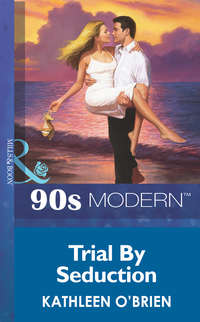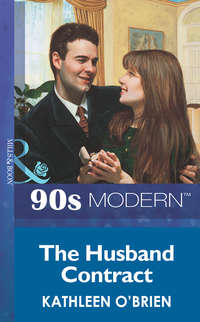
Полная версия
A Self-Made Man
Her father, telephoned by the nuns who ran the elite boarding school where Gwen had been incarcerated at the time, had been furious. What fool would bother such a busy man over such a triviality? “Just leave it alone, for God’s sake,” he had barked. “Your hair is problematic enough already.”
Problematic. Even at thirteen, she had known the word was a euphemism for “disappointing.” He’d found her problematic all around—from her messy hair to her bad grades, from her pitiful tennis serve to her intractable acne. And especially problematic had been her maddening habit of being in the way when her father wanted to be alone with Lacy.
Lacy Mayfair Morgan. Her “stepmother.” Her father’s new child bride. A child bride only five years older than Gwen herself. A child bride who, though she’d been born on the wrong side of the tracks, had definitely inherited what Gwen had started to sarcastically call the Sleek Gene.
As Gwen watched now, Lacy smoothly turned away from the tuxedo guy to speak to some other penguin-suited moneybags. The younger girl had a sudden, regressive urge to throw something down on her stepmother’s understated French hairdo. A spitball, maybe, or a water balloon…
Naw. Why bother? It would just give Lacy another chance to handle herself with magnificent aplomb, showcasing the Serene Gene, which apparently was also in her DNA. Gwen watched her stepmother move safely out of range, and she wondered if this was what God felt like. Bigger, higher, above the fray, comfortably able to pass judgment anonymously.
She sighed irritably. Probably not. For one thing, she was pretty sure God didn’t have pests like Teddy Kilgore fiddling insistently at her navel ring.
She captured Teddy’s thumb and squeezed it hard. “Put your paw on my belly button one more time, and I’ll break every one of your fingers.”
It was too dark up here for her glare to have much effect, but she frowned at him anyway. At twenty-one, Teddy Kilgore was two years younger than she was, a straight-A pre-med student, the apple of his snobby mother’s eye, and pretty much a roaring bore. But ever since the day Gwen had come home from boarding school wearing her first training bra, Teddy had been making passes at her every chance he got.
Sometimes she liked it. Sometimes she didn’t. Right now she wished he’d have another beer. Maybe then he’d pass out and let her concentrate on watching the Stepwitch.
No one but Teddy knew Gwen was in town yet. She would have to announce herself eventually, of course. She needed someplace to stay. And, naturally, she needed an advance on her monthly check, which only Lacy could arrange. But Gwen wasn’t ready. She wanted to have these few minutes of secret superiority, silently observing Lacy before the balance of power shifted, as it always did, back to her stepmother.
“Damn it, Teddy,” Gwen whispered, exasperated. The young man had leaned over and begun nibbling at the small gold navel ring, pulling it between his teeth. She couldn’t shove him away without losing an inch of skin, so she grabbed a handful of his silky black hair and tightened her fist warningly. “That hurts.”
He lifted his head and gave her a pout that he undoubtedly thought was sexy. “Aw, c’m’on. If you don’t want men to play with it, why do you wear it?”
“That’s the important word,” she answered, not easing her grip on his hair even fractionally. “Men. Unfortunately you don’t qualify.”
“Well, darn.” Teddy took his disappointment in stride. He rolled over, lying flat on his stomach on the loft, and wiggled his fingers in front of the spotlight. “Look,” he said mischievously. “I can make dirty finger shadows on the curtains down there.”
Gwen looked, wondering if there might be any amusement in a game like that, but though she could see some hazy movement on the curtains behind the podium, she couldn’t make out details. Teddy might have been creating a bunny or a T-rex. She squinted. Or maybe a profile of Adolph Hitler?
Teddy was chuckling, apparently more impressed by his efforts than she was. “Look. I learned this one at school. It’s two people with—”
“Shhh!” Gwen put her hand over Teddy’s fingers and captured them against her pink crystal-studded T-shirt. Lacy was nearby again, this time talking to someone Gwen couldn’t see. Gwen thought she had heard her own name mentioned. “I want to listen to this.”
“What—?”
“Shh!”
“—and we understand she’s been living in Boston,” the disembodied voice was saying, the tones making Boston sound as decadent as Gomorrah. A Pringle Island snob, then—Gwen knew the type. Her father had been the worst. “We couldn’t believe it, of course, but we were actually told that Gwen was installed in a doctor’s household…acting as an au pair!”
Lacy looked unfazed. “Yes,” she said. “I believe that’s true.”
“Oh, Lacy, my dear.” The speaker, who Gwen finally recognized as Jennifer Lansing, the town’s official Minister of Gossip, made a wounded little note of utterly false sympathy. “I know how you must feel. A nanny! After all the advantages you and Malcolm gave her, to be working as a, well, it’s really just a glorified baby-sitter, isn’t it? Malcolm must be turning over in his grave.”
Lacy laughed. “Surely he would understand. She’s quite young, after all. There’s plenty of time to pick a real career.”
Jennifer sniffed. “She’s only a few years younger than you, Lacy dear, and… Well, really, there’s no comparison, is there? Still, perhaps baby-sitting is a step up from her last job, which I hear was waitressing in Spandex tube tops at the Honeydew Café. Better babies than lewd old men with roaming hands, I suppose.”
Lacy bowed her elegant head, accepting the other woman’s sympathy. “I’m sure you’re right. But speaking of babies, have you seen the lovely Verengetti that was donated tonight? I can’t help picturing it in your conservatory. Not everyone has a room with enough scope and style to carry off a painting like that, but you…”
Gwen watched with a barely repressed fury as Lacy led Jennifer away. The nerve of those two self-satisfied snobs! Just exactly what did they think was wrong with being a nanny? Just because neither of them had any children… And as for the Honeydew Café—well, Jennifer was so tightly wrapped, so bony and repressed that people would pay her not to wear Spandex.
Besides, who had appointed them Gwen’s career counselors? She could spend a year laying sewers, if she wanted to. Or she could go be a rodeo clown. It wasn’t anyone’s business but her own.
She didn’t realize she hadn’t released Teddy’s fingers until he protested. “Hey,” he complained, tugging at them. “Ease up!”
She looked over at him, still half-blind with resentment. “Sorry,” she mumbled, trying to hold on to her composure. She felt more like screaming. She felt like yelling down at the departing Lacy that she didn’t give a flying flip what anybody thought of her choices—that her father might have turned Lacy into an obedient little robot-snob, but thank God he hadn’t managed to make one out of his daughter, too.
Teddy must have misinterpreted the intensity in her expression, because his eyes widened, and he made a clumsy move toward her, his lips already pursed for a big, juicy kiss. His awkward lunge pushed them both in front of the spotlight. Suddenly Gwen was truly blinded, this time by hot, white light. She realized that their writhing shadows must be projected on the podium backdrop below, like some X-rated shadow play.
A rather conspicuous method for announcing her arrival in town. The idea definitely had merit, she realized with a rising sense of defiant glee. She stopped struggling and let Teddy wrap his arms around her waist and lower his lips to hers.
Let’s see the Stepwitch handle this. Gwen had observed one indisputable fact through the years: if there was anything that made her frigid little stepmother uncomfortable, it was sex. In fact, she’d bet her trust fund that the widow Morgan, proud possessor of the Serene Gene, hadn’t had a real red-hot firecracker kiss in five years.
Maybe longer.
As Gwen guided Teddy Kilgore’s happily stunned face down toward her collarbone, she recalled what an icy, utterly passive, silently submissive wife Lacy Mayfair had been to Malcolm Morgan.
Heck, maybe ever.
She ran her hands up and down Teddy’s back with exaggerated strokes, knowing it would take broad gestures to attract adequate attention. Teddy responded enthusiastically. “Hot damn,” he murmured against her neck, and then set about taking advantage of his amazing good luck.
He wasn’t a bad kisser, actually. If she hadn’t had other things on her mind, she might even have enjoyed it. Her efforts were rewarded quickly. Within no more than a minute, she heard a few startled sounds from the people right below them. Slowly, as more and more people caught on, a rustle of curiosity moved through the crowd, silencing the normal hum of conversation.
Her fingers buried in Teddy’s black hair, Gwen twisted him a few inches to one side and peered over his shoulder into the audience below. Most of the people were watching the shadow show on the curtains, some smiling with incredulous amusement, some holding back shock with well-manicured, bejeweled fingers.
But one person had already figured it out. One face in the crowd was turned the other way, up toward the loft, up toward the spotlight. Staring straight at the actors.
It was Lacy, of course. Her beautiful face was pale, impassive, as always, but Gwen knew she must be horrified. Echoes came to her from years past. Her father’s voice. Disgusted. Cold.
Control yourself, Gwen, for God’s sake. Haven’t you ever noticed that Lacy never makes a spectacle of herself like that?
Gwen tilted Teddy’s shoulder out of the spotlight’s glare, and tossed her stepmother a broad grin and a wink.
Yeah, she thought wickedly. But I do.
CHAPTER TWO
TWO HOURS LATER, even though the auction was going beautifully, Lacy was done in. The band was still playing “baby” songs—a gimmick that had seemed quite amusing when they’d planned it a month ago.
“Baby, I’m Yours.” “Be My Baby.” “Baby, Come Back.” “Walking My Baby Back Home.” What had she been thinking? And all these paintings of babies—sleeping babies, nursing babies, crying babies, babies cradled lovingly in the arms of doting Madonnas. Suddenly Lacy found the whole thing completely exhausting.
Maybe it was Gwen’s absurdly rebellious arrival. Lacy could only imagine the resentment that had made the young woman put on such a display. When people had begun noticing the sexy silhouettes on the curtains, they had been transfixed—as Gwen had no doubt intended. For a moment Lacy had been stumped. How was such a flagrant piece of bad manners to be handled? Finally, though, she had decided to chuckle, announce that apparently her stepdaughter had joined a theater troupe, and then begin to softly, calmly applaud the performance. Other chuckles had followed, other applause had joined hers, and finally two sheepish young faces had peered down from the loft and grinned.
And, thank heaven, the crisis was averted.
Still, it had taken a lot out of her. Gwen had avoided her the rest of the evening, but Lacy knew a confrontation was inevitable before the night was over. Gwen never came back to the island unless she wanted something, and she never asked nicely. Lacy didn’t blame her. It must be galling to have to ask at all.
And yet, wasn’t it unfair of fate to ask her to handle Adam’s return and Gwen’s bitterness all in one night? Her head was aching, and she longed to go home, crawl under the covers and sleep for a week.
However, as chairman of the fund-raising committee, she couldn’t leave until the last bid was in the box, the last champagne glass drained, the final donor safely out the door. But she simply had to have a moment alone.
She looked around guiltily, like a prisoner scanning the tower watch. For once no one was bearing down on her, requiring a decision or requesting an opinion. Holding her breath, she eased into the small, remote stall at the end of the aisle, an area half hidden by a bank of lush ferns laced with small sparkling white lights. Formerly the stable’s breeding chute, it was too narrow to allow an effective display, so only two or three paintings hung on its padded walls. Most of the guests probably didn’t even know the space was there.
Grateful for the privacy, she pretended to study the largest painting. Ironically, it was one of her late husband’s, which she had donated to the auction somewhat self-consciously, aware that giving away a painting you despised hardly qualified as generosity. She wondered if anyone would buy it. Though it was technically proficient—executed by a fairly well-known Southern artist—she had always hated the thing.
Saturday Morning: Half Past Paradise, it was titled. It showed a sunny summer day in a rustic setting by a river. In the foreground two young lovers lay on a blue-checked picnic blanket, locked in an erotic embrace. In the background, on the corner of the blanket nearest the swiftly flowing water, an infant lay sleeping, utterly forgotten.
Malcolm had bought the painting only a year into their marriage, and had always hung it in a prominent place. Lacy had never told him how she felt about it. Why should she? She hadn’t ever told him how she felt about anything.
“If you want to melt into the woodwork, I’d advise a different dress.” The sheltering curtain of fern fronds rustled, and suddenly Adam Kendall was in the stall, standing right behind her. The white lights crowned his dark head like a twinkling halo. He touched her sleeve, his fingers deeply tanned against the blue silk. “Something less conspicuous. This is the uniform of a player, I’m afraid. Not a bench warmer.”
She looked at him, his broad shoulders effectively blocking the entrance to the shed, and was suddenly uncomfortably aware that these breeding chutes had originally been designed to prevent reluctant mares from escaping.
She fought down a moment of panic. He had caught her, and that was that. She had always known, deep inside, that this day would come. Once she had longed for it, dreamed of it, imagined it down to the clearest detail. Now she just wanted to get it over with.
“Ten years,” she said musingly, half to herself. “Ten years since we’ve seen each other, and all we can find to talk about is clothes?”
He continued to finger the silk, a small smile playing at one corner of his mouth. “But I thought we were doing quite well. It isn’t easy to find the perfect metaphor, you know. Reading between the lines is a dying art, don’t you think?”
How could she pretend not to understand? And, in a way, he was right. Their clothes really were symbols, weren’t they? His old white-kneed jeans and rust-speckled T-shirt had said poverty, hunger, ambition. This new designer tuxedo said luxury, triumph, complacence. But the ratty old T-shirt had smelled so comfortingly of soap and sunshine, and of him. When she had pulled it off, over his shoulders, over his head, she had always pressed it against her face and inhaled deeply, taking him into her lungs before tossing it aside.
Ten years ago, his unkempt black waves of silky hair had said rebellion, defiance, indifference. This new elegant, sculpted disarray said sex, power, confidence. But those tousled waves had always tumbled toward his eyes as he lowered himself over her, dipping his head to her breast. The locks had feathered her skin as he kissed her.
For a long moment she simply studied him, listening to everything his new persona had to tell her, from his squared shoulders to his gleaming cuff links. From his smile to his suntan. From his perfectly knotted tie to his arrogantly arched eyebrow.
But what about that scar? Just below his left eye a tiny line glistened, as if someone had traced the high curve of his cheekbone with a thin silver pencil. Or a knife blade. Where had it come from? What did it say? She stared at the scar, realizing that it was the only imperfection he retained. The only proof that the ten years without her hadn’t been an unbroken string of success and laughter, of wealth and women and satisfied abundance.
“When did you get that scar?” She raised her gaze to his, wondering why, of all the questions she had stockpiled during a decade of silence, that was the only one she could bring herself to speak.
“Years ago. There was an explosion. About a hundred inch-long pieces of glass tried to carve their initials on my face.” His voice was mild and expressionless, as if he were discussing the weather. “One of them did a pretty good job.”
“Was it an accident at work?” She fought the urge to touch the silver scar, to test its depth, to measure with her trembling finger how close it had come to his eye. “At the refinery? I remember that the job was supposed to be dangerous….”
He smiled shallowly. “They don’t ordinarily give you hazard pay unless there’s some hazard involved. And that’s why I took the job, wasn’t it? The idea, if I recall correctly, was to make my fortune as quickly as possible so that I could get back home.” He shrugged. “It seemed rather urgent at the time.”
She swallowed hard, remembering all too well. “But an explosion… You could have been—”
“What? Killed? Too messy for you, Mrs. Morgan? Perhaps you think I should have married my fortune instead.” His voice was low, his eyes speculative as he pretended to consider the idea. “I suppose that would have been simpler. But call me old-fashioned. I’ve always thought money you actually work for sits a little easier in your pocket.”
She felt herself flushing. “Adam…” She couldn’t meet his gaze. “Adam, don’t—”
He laughed softly. “Poor Lacy. You don’t care for this subject, either? All right, then, let’s see… We’ve eliminated the topic of our clothes. The past is off-limits. The truth is forbidden.” He leaned against the teasing wall and scanned the small chute. “Well, I hear you’re an art expert. We could talk about this horrible painting.”
“Adam.” She was shaking her head, trying to take a deep, calming breath. She wanted desperately to leave the stall, but he was blocking her exit. The front of the chute had a panic clutch, but it was on the other side, where breeders could quickly release a mare that was in danger. Ironic, she thought, that an unhappy horse could escape this chute, but a trapped woman could not.
He had come up very close behind her, and was looking at the painting over her shoulder. “Half Past Paradise… Interesting title,” he said, putting his hands on her shoulders, turning her around to face the picture as if she were a doll, his to pose at will. “Don’t tell me you like it. I won’t believe you.”
She willed herself to go numb, to ignore his strong fingers against her bare shoulders. She was not going to make a fool of herself. And she wasn’t going to let him presume to tell her what she thought, what she felt.
“It’s a very good painting, actually,” she heard herself say in her best art-school voice. She summoned the vocabulary of the tour guide. “It’s one of Franklin’s best works. The composition is sophisticated, with strong movement in the lines, the river running left to right, the bodies lined up at a forty-five-degree angle. The asymmetry suggests dissonance, confusion, danger.”
“Baloney. Pure textbook baloney,” he observed, calmly unimpressed. “I’m sorry, Lacy, but I know your taste too well. I know you too well. You hate this picture. It may have technical sophistication, but that’s not what you look for in art, or in life. You want vitality, passion, heart—and this garbage has none of those things. You’d never hang it where you’d actually have to look at it.”
Furious, she edged out of his grip, swiveled and met his smug gaze, lifting her chin. “Perhaps you don’t know me as well as you’d like to believe, Adam. Things change a lot in ten years. People change.”
He shook his head. “Not that much.”
She laughed. “Oh, yes, Adam, that much and more. You see, that painting belonged to my husband. It hung in my home, over our library mantel, in a place of honor. I’ve looked at it every day since I was married. Every single day for ten years.”
For a moment he didn’t respond, and she took advantage of his silent surprise to slip past him. She was almost free when his hand caught her wrist.
She turned and glared at him icily, willing him to release her. It was a look that had intimidated many an importunate admirer.
But of course it didn’t work on him. Not on Adam.
“I’m beginning to wonder,” he said quietly, studying her face, “if I might have been wrong.”
“Wrong about what? That I’ve changed? Yes, Adam, you were quite wrong about that. Now, if you’ll excuse me—”
“No,” he said, a half smile curling his upper lip, and a sardonic angle high on one dark eyebrow. “I mean I may have been wrong about married money.” He looked down at her huge, vulgar, square-cut diamond, tilting her hand so that it flashed in the light. “It’s quite possible that you had to work much harder for your paycheck than I did.”
GWEN DIDN’T SHOW UP at the house after the party, for which Lacy should have been grateful. But as the long night wore on, Lacy realized that even an argument with her stepdaughter would have been preferable to being alone with her thoughts.
Lacy pounded her pillow for hours, making an inventory of the deadly comebacks she should have used, the perfectly crafted put-downs that would have forced Adam Kendall to choke on his own effrontery. But a fat lot of good they did her now, spoken only to Hamlet, her silver Persian kitten who blinked at her angry tone, curled up in the crook of her knee, and fell asleep halfway through her best line.
Stroking Hamlet’s silken fur and envying him his easy slumber, she struggled for hours with frustration, confusion and something that felt like fear. How long was Adam planning to stay? And how much damage could he do to her peace of mind before he grew tired of the game and jetted away again to parts unknown?
She buried her face in her pillow. Oh, God, what was she going to do? The question drummed against her mind relentlessly—but she found no answer in the desperate darkness.
When dawn finally crawled in through the window, Lacy unwound herself from the knotted covers with relief. She hated this feeling—and she despised the wreck she saw in her mirror, all puffy eyes and tangled hair.
Suddenly her pride came marching in belatedly to her rescue. This wasn’t Lacy Morgan. This looked more like pitiful Lacy Mayfair. And she wouldn’t stand for it—she had fought too hard to banish that lonely little girl. Lacy Mayfair had foolishly allowed Adam to have the final word last night. But this morning belonged to Mrs. Malcolm Morgan.
So…what was she going to do? She was going to do what she had always done. She was going to protect herself and survive. She was going to take the lessons she’d learned over the past ten years and put them to work. Lessons about courage, about compartmentalizing, about burying unwanted emotions, about squaring her shoulders and soldiering on. She was going to wrap herself in indifference so thick even Adam Kendall’s blue eyes couldn’t pierce it, so cold even his hot fingers couldn’t melt it.
In fact, she told her reflection sternly, for the first time in ten years she was now completely free. A long-dreaded storm had finally broken. After ten years of seeing Adam only in dreams, she had been forced to talk to him, look into his eyes, feel his fingers on her skin.
It had hurt, but she had survived. Fate had fired its last bullet at her—and it had missed. There was nothing left to fear.
Two hours later, when she arrived at the hospital, a cucumber lotion had soothed her eyes, a small silver clip snugged her hair neatly into its accustomed French twist, and a crisp ice-blue suit completed the picture of a calm working professional.
No more angst. Now it was simply back to business. Raising money, putting out office brush fires, posing with happy parents who wanted to remember their friends on the staff of Pringle Island General Hospital. These were all things that the competent Lacy Morgan, director of community relations, could do in her sleep.












